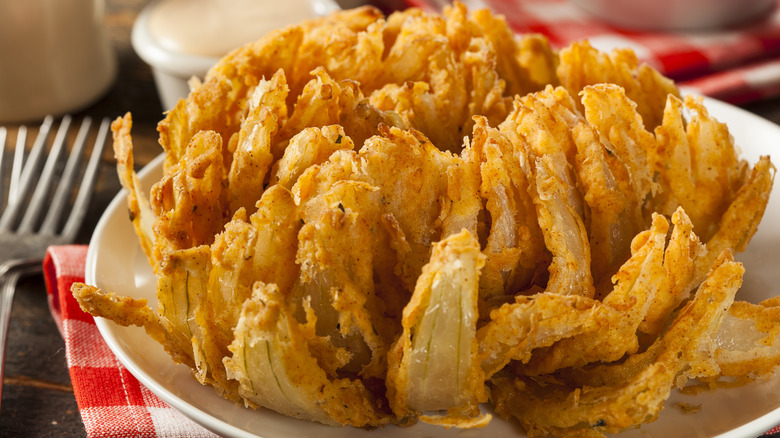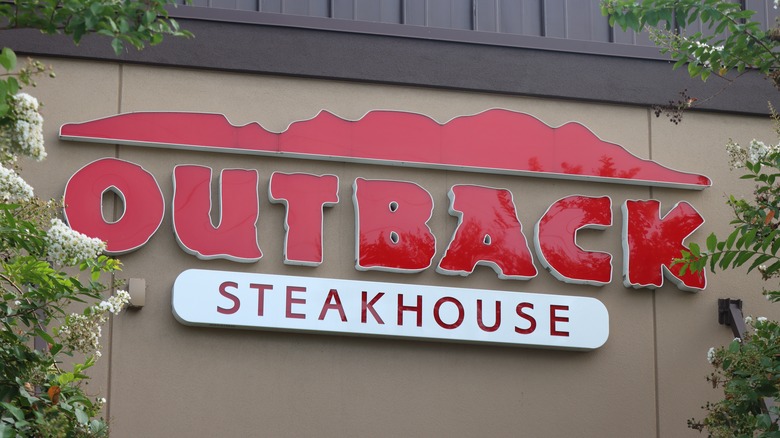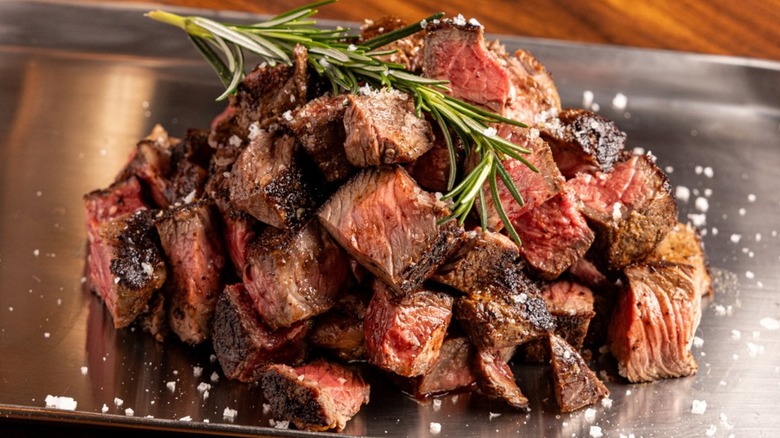Outback Steakhouse's Origin Has Nothing To Do With Australia
Trips to Outback Steakhouse and a Bloomin' Onion are the stuff of fond childhood memories, epic nights out with the family, or fun times with a group of friends. (And yes, you definitely can reheat a Bloomin' Onion in your air fryer at home, so there's a great reason to get one to go.) This Australian-themed restaurant has been around for so long that it's made itself an integral part of America's restaurant landscape. (Daily Meal ranked it ninth in our ranking of America's best casual steakhouses.) But is it really Australian? Absolutely not.
Outback Steakhouse is still fairly new, in the grand scheme of things. The first location opened in 1988, and it was more than 9,000 miles from Australia. Since that first restaurant in Tampa, Florida, Outback has opened hundreds more — including several in Australia. (Eight, as of this writing.) But initially, the restaurant had no real connection to Australia apart from the fact that the founders thought that the Australian mindset captured the vibe they wanted for their friends-and-family-friendly restaurant, and they ran with it.
In an article for the Ewing Marion Kauffman Foundation, American Outback founder Chris Sullivan wrote, "From the beginning, we were very clear that while Australia was our theme, American was our biggest customer. So, when developing the Outback concept, our founders decided not to go to Australia!" What? But, why?
Outback's founders were worried about being too authentic
Here's a super-fun fact. Ask anyone who's been to one of America's growing number of Brazilian-style steakhouses if they're worth the hefty price tag, and they'll probably say yes. But go to Brazil, and you might be shocked to learn that Outback Steakhouse has been voted the most popular restaurant in Rio de Janeiro for years, and a whopping 83% of Outback's international revenue comes from Brazil. Pretty cool, right?
So, what about their connection to Australia? In his article for the Ewing Marion Kauffman Foundation, Sullivan explained that at the end of the 1980s, most of the steakhouses in America were western-themed. "We saw a 'Down Under' concept as different, but consistent with people's expectations for a casual steakhouse. 'Outback' had a casual, come-as-you-want feel, and 'Outback Steakhouse' was both easily spoken and easily remembered."
But it turns out that idea came with a massive caveat, and simply put, they knew that they didn't want to get too authentically Australian. Americans were getting their ideas about Australia from the recently-released "Crocodile Dundee" and the America's Cup, so they wanted to capitalize on those images. "Americans were fascinated with their notions of 'the land Down Under.' We were concerned that too much authenticity might cause a disconnect between these perceptions and the real thing." The result was a restaurant that might more accurately be described as what America thinks Australia is... but not, in fact, truly Australian.
Outback's menu definitely isn't Australian
The one item that sets Outback Steakhouse apart from other steakhouses is the Bloomin' Onion, so it might make sense that this trademark dish, at least, is Australian. It isn't.
The Palm Beach Post covered a talk given by Outback's Tim Gannon in 2015, and interestingly, that was at about the same time he was getting ready to open a Peruvian-themed restaurant. He created Outback's Bloomin' Onion after being inspired by New Orleans chef, restaurateur, and innovator Paul Prudhomme, who is synonymous with Cajun cooking. It was Prudhomme's use of spices that inspired Gannon, who said, "There is something America needs. It is bold flavors and spices." So, he combined that with the idea of cutting vegetables to look like flowers, made the Bloomin' Onion, and it became Outback's signature dish.
Take a look at some of their other dishes, and it'll become clear that they don't really have anything at all to do with Australia. The phrase "shrimp on the barbie" – as seen in their Grilled Shrimp on the Barbie — was made up in 1983, first appearing in an Australian Tourism Commission commercial targeting U.S. travelers. Kookaburra wings? Kookaburras definitely aren't chickens, but the wings are. Aussie Cheese Fries? Cheese fries are American. Toowoomba Salmon? Toowoomba isn't even on the coast. And what about Alice Springs Chicken? Who knows! A chicken may have lived there once, but that's about it as far as authentic Australian influences go.


